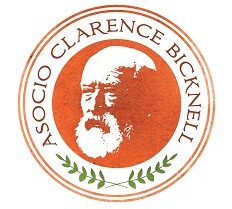We celebrated by Zoom on Friday night the ten years since Graham Avery started working with us on Clarence. Below you can see the first email which Graham sent to us, ten years ago. The first of many of course. His numerous articles are at www.clarencebicknell.com/documents. He told us about the books he is writing on Fritz Mader and on Reginald Farrer.
We discussed our progress with the publication of the Book of Guests in Esperanto, Clarence’s Esperanto text on his favorite guests and the accompanying arts-and-crafts framed mountain flowers.
We much appreciated the input from Esperanto experts Humphrey Tonkin and Anna Lowenstein, and much of the call was devoted to the universal language. We heathens were treated to a conversation between the two of them … in Esperanto. Anna evoked Rosa Junck, an Esperanto colleague of Clarence in Bordighera. To add to the hard facts of her involvement in the Esperanto movement internationally I quoted an anecdote from Valerie Lester’s MARVELS page.142…
“Esperanto caused Clarence to spend more and more time in the company of Rosa Junck. Born in 1850 in the town of Tabor in Bohemia (now in the Czech Republic), Mrs Junck, née Bilek or Bilekova, had arrived in Bordighera in 1890. A widow and an exceptional linguist, she set herself up in business as a language teacher. She and Clarence translated works into Esperanto and wrote articles for magazines, and they both played important roles at the Boulogne congress in 1905. But sometimes their Esperanto work took a different turn. In a letter to Alberto Pelloux in 1906, Clarence relates: ‘The other day Mahdi [his dog] and I have sat in the garden translating into Esperanto. Mrs. Junck wants me to act with her in the next Geneva Esp. Congress, in a comedietta of De Amicis, La floro de l’pasinto, which she has translated, but as she is the heroine I am not invited to take the lover’s part (who is, she does not tell me). I have declined.’”
Clarence had a good accent, quite English, but good. Esperanto has changed immensely since the beginning of its life; the vocabulary has increased hugely, and early Esperantist like Clarence were ingenious in their use of the language. We relish the chance to bring the Book of Guests in Esperanto to a wider public later in the spring of 2022.
Humphrey Tonkin was interested in the poems Clarence chose to translate and wondered whether they came from an anthology of English poetry. Giovanni was able to inform us, from his detailed knowledge of Clarence’s collection of books in the Museo Bicknell and in the other Bordighera library he helped create, the Biblioteca Civica Internazionale, that the only anthology in the collections post-dated most of Clarence’s Esperanto work. He said it would be possible to do some more work to identify the books Clarence would have referred to. Marcus indicated that many of the vellum-bound albums, inlcuding those in the Fitzwilliam Museum in Cambridge, feature well-known poems in English which Clarence has illuminated with borders and images of wild flowers.
From: Graham Avery
To: <marcus@bicknell.com>
Date: Sun, 18 Mar 2012 21:58:25 +0000
Subject: Clarence Bicknell & Reginald Farrer
Dear Marcus Bicknell. Being interested.in Clarence Bicknell I visited the Musée des Merveilles at Tende and the Museo Bicknell at Bordighera in February 2008. I have a number of books about him, and have read the article on him by Peter Bicknell in ‘On Beacon Hill’. In August 2008 I stayed at the Refuge des Merveilles to see the rock engravings in that area, and in July 2012 I plan to stay at Casterino to see Casa Fontanalba and the engravings in that area.
The reason why I am writing to you is that the other day I found on the internet your transcription of the Casa Fontanalba visitors’ book, where on 19 July 1910 the name of Reginald Farrer appears together with that of Clarence Elliott. Your transcription adds notes on Elliott and Farrer and their roles in alpine gardening and plant hunting, but I wonder if you are aware that Farrer later mentioned this encounter with Bicknell in two of his publications?
In ‘Among The Hills’ (1911) Farrer described his visit to Val Casterino in 1910, and in ‘The English Rock Garden’ (1919) he referred to Clarence Bicknell as ‘a famous English botanist’, recommending readers to visit the house where he ‘spends long summers in the course of which he asks nothing better than to show the treasures of the hills to such fellow-collectors as desire to see than’
I have been interested in Reginald Farrer for some time, particularly his books on his botanical excursions in the Maritime Alps (‘Among The Hills: A Book of Joy in High Places’) and the Dolomites (‘The Dolomites: King Laurin’s Garden‘).
If it is of interest to you, I could submit a short piece for publication in ‘On Beacon Hill’ about Bicknell and Farrer, quoting more fully the passages from the books mentioned above, together with a few comments on the two men and their encounter in 1910.
Best wishes, Graham Avery
